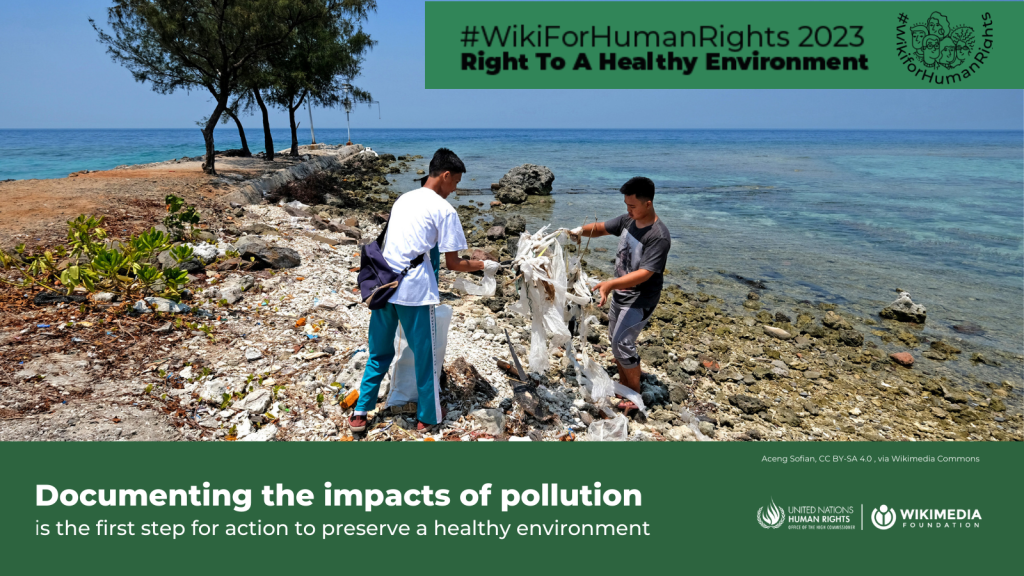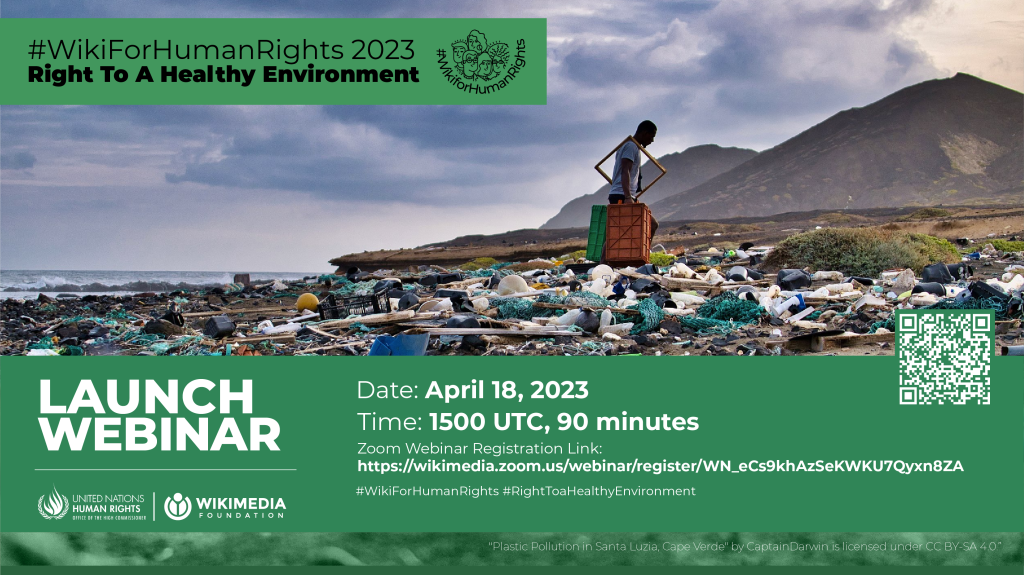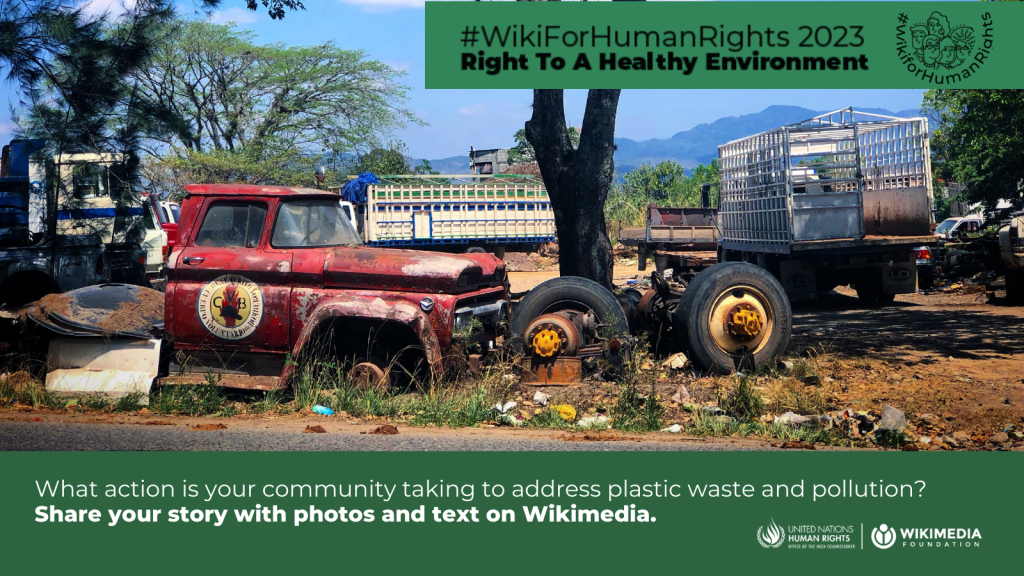The #WikiForHumanRights campaign is an exciting opportunity to contribute to strengthening knowledge on climate and sustainability across the Wikimedia movement. In 2023, we are excited to invite volunteers to write and improve content on Wikipedia about human rights, environmental health, and the impact of environmental crises on diverse communities around the world. You can join events and writing contests from 14 April – 30 June 2023.
To enact the right to a healthy environment, those most affected by environmental degradation need up-to-date knowledge to inform their approaches to defending the environment, participate in decision-making, and access justice. Ensuring that everyone has access to updated information also helps us better mitigate these crises while we work collectively to adapt strategies to ensure a healthy future for all. Filling gaps on Wikipedia about these topics helps the public make the thousands of decisions needed to address these pressing environmental crises.
Join Us
We need your help to contribute to strengthening knowledge on climate and sustainability across the Wikimedia movement! To lend your hand during the campaign, you can participate in the following actions:
- Join the April 18 Launch Webinar — learn more about the role of information in preserving human rights in the context of the global pollution crises
- Join the Writing Contest — help us create local knowledge on key human rights and environmental knowledge topics in more languages, this year the special focus is on Pollution
- Connect with Local Communities — Join an event in your language or community
- Join the Human Rights Interest Group — advise the Wikimedia Movement on addressing human rights
Join the Launch Webinar!
On 18 April at 15:00 UTC, we invite you to join the launch of this year’s #WikiForHumanRights campaign, with a special focus on the Pollution crisis. Register here on Zoom.
Pollution can be found in all corners of the world. The true cost of pollution is foisted on everyone; however, it has disproportionate impacts on persons, groups and peoples in vulnerable situations such as children, women, Indigenous Peoples, coastal communities, people living in extreme poverty, surrounding communities affected by production facilities, and workers at heightened risk of occupational exposure, including waste-pickers.
This panel explores how improved public knowledge, through platforms like Wikimedia projects, can help both global and local communities better understand and exercise their right to a clean, healthy and sustainable environment in efforts to prevent, minimize and remedy pollution. Join panelists Monika Stankiewicz (Executive Secretary of the Minamata Convention on Mercury), Jo Banner (Co-Founder & Co-Director, Descendents Project) and Soledad Mella Vida (Asociación Movimiento Nacional Recicladores de Chile) as they discuss how public knowledge can play an important role in protecting human rights and the environment.
The event will include live translations in Spanish, Portuguese, French, and Arabic.
Join the Global Writing Challenge
From 17 April to 17 May 2023, Wikimedians everywhere are invited to join a global writing challenge aimed at bridging content gaps on human rights, environmental health, and the impacts to diverse communities across the world. The theme for this year’s writing contest explores the impact of pollution on our human rights, health and environmental well being.
Join Community Events
There will also be a variety of activities and events happening across different regions in the movement, including webinars, edit-a-thons, workshops, and local writing contests. Lend your voice and your hand to this important work by finding and joining an event on an event on Meta.
This year, the campaign is being coordinated regionally in 7 communities: the Maghreb, Arab-Speaking Communities, Francophone Africa, Spanish speaking communities, Lusophone Communities, Anglophone Africa, and Central and Eastern Europe. If you need help organizing an event or helping the regional team, reach out to your regional coordinator. It’s not too late to host something!
Become part of the Human Rights Interest Group by signing up here!
Are you interested in addressing human rights related content gaps on Wikimedia projects? Do you want to make your community’s human rights concerns and challenges more visible to the Foundation? Are you unsure how to stay safe when contributing from a hostile editing environment? If you answered yes to any of these questions, then the Human Rights Interest Group (HRIG) might be the right space for you! Join the HRIG, a loose group of community members who meet with the Wikimedia Foundation’s Human Rights Team on a semi-regular basis. The HRIG provides a safe space to address and discuss topics such as:
- Foster human rights awareness when creating content: Both Wikimedia contributors and people they may have contributed about can face real life harm because of their involvement with Wikimedia projects.
- Fill content gaps on human rights: The amount and diversity of human rights related content on Wikimedia projects is relatively slim. The HRIG is a space to express the human rights concerns of your country and region, so that they are heard within the broader community and understood by the Foundation.
- Stay in touch on human rights: The HRIG creates a platform for ongoing cooperation and dialogue between community members and the Foundation on human rights related issues and how to increase community safety.
Does this sound interesting to you? Sign up for the HRIG here, reach out to talktohumanrights@wikimedia.org or read more via meta.
Share the story and learn more!
Follow us on Twitter @Wikipedia,@Wikimedia, and @WikiSusDev or join the WikiForHumanRights Telegram Channel for event details and updates as the campaign continues through the 30th of June 2022 and check back for updates on the event page. Use the campaign hashtag #WikiForHumanRights to spread the word. You can also write to campaigns@wikimedia.org if you have questions.

Can you help us translate this article?
In order for this article to reach as many people as possible we would like your help. Can you translate this article to get the message out?
Start translation


